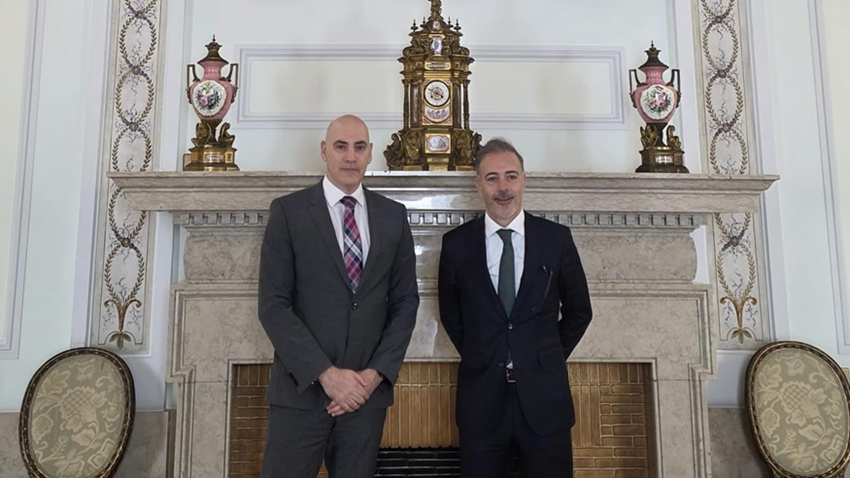On May 12, 2015, at the 5th Global Forum to Combat Antisemitism held in Jerusalem, David Garrett, then a delegate on the board of the Jewish Community of Oporto, presented a proposal for a Universal Declaration of Human Duties. He believed it could be valuable if it were ever proclaimed at the UN, which is currently so polluted by policies, ideologies, and interests far removed from Jewish values and the natural law recognized by the great ethical traditions.
The PJN recalls this proposed Declaration:
Preamble
Whereas humans are endowed by their Creator with inalienable rights that should be respected by all societies and cultures at all times;
Whereas human rights are devoid of precise meanings if the strict definition of the corresponding duties is not known;
Whereas human rights should not continue to have different meanings for different people, nor should they be perceived as anti-rights;
Whereas each people’s particular law, despite its cultural specificity, must respect the principles which are the basis of human society since the dawn of Civilization:
The General Assembly proclaims this «Universal Declaration of Human Duties» as common standard for all peoples and all nations, so that the whole of mankind can build a better world.
Awareness and acceptance of the duties enunciated below will be promoted throughout the world.
Article 1
(Duties to nature)
Every human being has the duty to respect and preserve the atmosphere, the water, the ground of the Earth, the flora, and all that exists in nature, so that present and future generations can benefit from its potential.
Article 2
(Duties to animals)
All human beings have a duty to respect animals and consider them their minor, conscious and sensitive siblings. Human beings are allowed to extract food from the animal kingdom but the life of the animals must be taken without pain and suffering and their meat prepared and cooked in order to be ingested without vital signs.
Article 3
(Duties to mankind)
Every human being should recognize the sanctity of life, gender, property and justice. The dramatization or trivialization of cruelty, the use of knowledge to promote injustice or human indignity and pornography are not allowed.
Article 4
(Duties to fellow human beings)
All human beings have a duty to consider the honour of their fellow human beings as dear as their own honour and behave as an agent of social peace in all circumstances and environments, in their relations with family, friends, neighbours and co-workers.
Article 5
(Duties to family)
All human beings have a duty to use their skills to protect and take care of their family, especially their spouse, the elderly and minors. Whoever is in charge of the education of minors has a duty to refine their manners and to inculcate in them, with love, loyalty and understanding, the virtues of universal mankind.
Article 6
(Duties to one self)
All human beings have a duty not to debase body and soul with practices that hurt their integrity or are demeaning. No one is granted the freedom to jeopardize his or her own life, exposing himself or herself to diseases, harmful products or unnecessary risks.
Article 7
(Duties with regard to sexuality)
All human being have a duty to seek their partner’s happiness without perversions, within a relationship which confers stability and permanence in love. Illicit sex can be tolerated occasionally, but does not constitute a right.
Article 8
(Duties to property)
All human beings have a duty to be honest in business and to fulfill their obligations, respecting other people’s material or immaterial, public or private, individual or collective goods.
Article 9
(Duties regarding the use of wealth)
All human being have a duty to use part of their wealth to help build a better world and to help the handicapped and the needy, fighting sub-nutrition, under-medication and ignorance. States, collective persons and natural persons must always address, in both action and thought, social concerns.
Article 10
(Duties to the truth)
All human beings, no matter how high their position or status, must act in the interests of truth, while being aware that the iniquities of the tongue cause most conflicts of humankind. No one may disseminate false ideas that, once widespread, can produce situations of grave injustice.
Article 11
(Duties regarding work)
All human beings, of legal age and having the capacity and the condition to do so, have the duty to work to be useful to society and to meet the needs of their family. No one is granted the freedom to be lost in idleness.
Article 12
(Duties regarding school education)
All human beings that are responsible for school education should pass on to their students, in addition to technical knowledge, notions about rights and duties, delicacy of manners, elegant language and civilized behavior. It is up to the students to respect their teachers, to study and enable the other students to study.
Article 13
(Duties to Justice)
All human beings have a duty to promote a justice system with honest laws and fair courts in the territory where they dwell and in the international order, ensuring the political and the social destiny of the human community and scrutinizing, within the limits of the law, the authorities ruling it.
Article 14
(Sanctions)
The appropriate sanctions to ensure the compliance of all the duties listed above by all humans must be typified, within the spirit of this Declaration.
Explanatory Memorandum
The reasons justifying the proclamation, by the UN, of the Universal Declaration of Human Duties are of various natures.
1) This Declaration will enable the determination of the exact scope of each “human right” in particular. Human rights” cannot go on meaning different things to different people, nor can they continue being considered as anti-rights. “Human rights” must be a synonym of peace, not of strife; because human rights have G-d’s law as a source (as we can read in the United States Declaration of Independence) and not man’s law, which is merely, and will always merely be, the law of the strongest.
2) This Declaration would incorporate in the law the principles which are the basis of human society since the dawn of Civilization. These principles generically recognized by the Declaration of Global Ethics of the Parliament of World Religions form the meeting point of all monotheist religions and, to a great extent, of the rest of the beliefs. These are very simple rules, easily memorized by people and that have in its core the religious, cultural and racial pluralism of all mankind. These are rules which include an objective definition of good and evil and which confer a very special sanctity to life, to sex, to property and to justice.
3) The achievement of universal peace and the eradication of Antisemitism are linked and based on the principle of the belief in G-d. They will not be possible while the world is governed by agnostic ideologies; while international law is not rebuilt on a theistic basis. The forces of the Cosmos worshipped by aboriginal tribes, as well as the love for the transcendent, knowledge and meditation (after all, the practical paths of religions of the Middle East, China and India), all converge to a unique and supreme strength: the unique G-d. G-d must be placed in the spirit and in the letter of the international law, not as shadow, but as affirmation! This is not about imposing the belief in G-d by law. Neither is the belief in parental authority imposed by law, but law imposes respect for parental authority; and with greater reason must it impose respect for G-d.
4) This Declaration would integrate Muslims, as many other peoples too, in modern society, causing them to "tolerate" a political system, which many of them accuse to be increasingly associated with pornography and the freedom to destroy the other. The Seven Laws of Noah are stipulated in the Quran: 17:22, 17:23, 17:33, 17:32, 17:34, 17:35, 17:36.


































